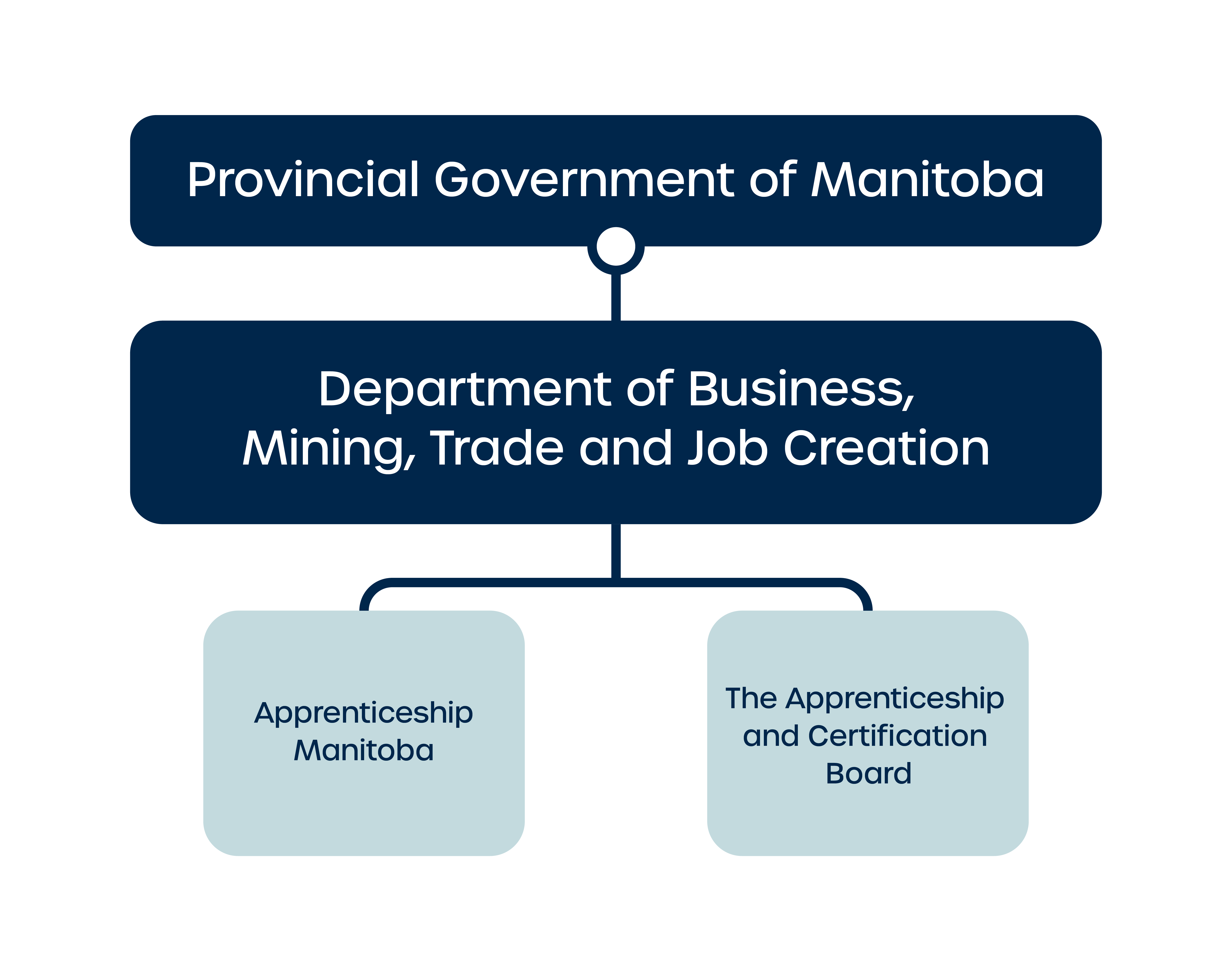Regulatory Amendments to the Apprenticeship and Certification System
Several important changes have been made to the apprenticeship and certification system in Manitoba, to enable efficient program response to emerging industry needs, align Manitoba with interprovincial Red Seal standards, and to focus on high-quality apprentice training and safety.
These changes will take effect on October 30, 2024. Please click on the document below to review all changes and how they may affect you.
Governed by The Apprenticeship and Certification Act, Apprenticeship Manitoba contains various consolidated regulations that work to maintain the organizational structure of the apprenticeship system in Manitoba.
 The Apprenticeship and Certification Act
The Apprenticeship and Certification Act
Designated trades in Manitoba are governed under The Apprenticeship and Certification Act. The trade regulations are made for the compulsory trades on the recommendation of the Apprenticeship and Certification Board, based on insights from various committees and working groups, and legislated by the Manitoba government. Similarly, the voluntary trades and occupations are developed by the Apprenticeship and Certification Board on the advice of industry committees and working groups to specify the standards for each trade.
Each province may designate provincial trades that meet their unique training and certification needs. Industries in Manitoba that want to advance the skills and standardize training of their workforce may apply to have a trade and/or an occupation designated as either a national or provincial trade or occupation. The application process is handled by the Apprenticeship and Certification Board.
The standards and training for a new designated trade or occupation in Manitoba is based on a Provincial Occupational Standard. This analysis is developed in consultation with industry stakeholders.
Back to TopGeneral Regulation
The Apprenticeship and Certification General Regulation outlines the designated trades and occupations in Manitoba. It also includes details about the apprenticeship program including the Apprenticeship Agreement, employer and apprentice responsibilities, including ratios and wage rates, and certification.
Apprenticeship and Certification — General RegulationCompulsory Trade Regulations
Trade regulations refer to the rules and guidelines governing apprenticeship programs in mandatory trades, encompassing trade definitions, tasks, program requirements, and more.
- Trade of Construction Electrician
- Trade of Electrologist
- Trade of Esthetician
- Trade of Hairstylist
- Trade of Industrial Electrician
- Trade of Refrigeration and Air-Conditioning Mechanic
- Trade of Sprinkler Fitter
- Trade of Steamfitter-Pipefitter Regulation
- Trades of Boom Truck Hoist, Mobile Crane, and Tower Crane Operator
Trade and Occupation By-Laws
In June 2021, Bill 61: The Apprenticeship and Certification Amendment Act came into force, which enacted the Apprenticeship and Certification Board (Board) to transition all apprenticeship voluntary trades program, consolidated regulations, into Trade and Occupation By-Laws.
The following 46 Trade and Occupation By-Laws came into force on October 30, 2024, among other regulatory amendments.
The transition to Trade and Occupation By-Laws is transformative. It allows the ability to align with national Red Seal requirements in a more timely manner to respond to industry and employer needs to ensure workers have the right skills at the right time.
Voluntary Trade By-Laws
The following 44 Trade By-Laws came into force on October 30, 2024.
Trade By-laws outline:
- Definitions
- Tasks and functions of the trade
- Apprenticeship program
- Certification requirements
Specific trade requirements are also outlined in The Apprenticeship and Certification General Regulation. The regulation should also be referenced when reviewing the Trade By-Laws.
- Trade of Agricultural Equipment Technician
- Trade of Aircraft Maintenance
- Trade of Auto Body and Collision Technician
- Trade of Automotive Refinishing Technician
- Trade of Automotice Service Technician
- Trade of Boilermaker
- Trade of Bricklayer
- Trade of Cabinetmaker
- Trade of Carpenter
- Trade of CNC Machinist
- Trade of Concrete Finisher
- Trade of Construction Craft Worker
- Trade of Cook
- Trade of Diesel Engine Mechanic
- Trade of Floorcovering Installer
- Trade of Gas Turbine Repair and Overhaul Technician
- Trade of Gasfitter
- Trade of Glazier
- Trade of Heavy Duty Equipment Technician
- Trade of Industrial Mechanic (Milwright)
- Trade of Instrumentation and Control Technician
- Trade of Insulator (Heat and Frost)
- Trade of Ironworker (Generalist)
- Trade of Landscape Horticulturist
- Trade of Lather (Interior Systems Mechanic)
- Trade of Machinist
- Trade of Marine and Outdoor Power Equipment Technician
- Trade of Painter and Decorator
- Trade of Parts Technician
- Trade of Plumber
- Trade of Pork Production Technician
- Trade of Power Electrician
- Trade of Pre-Engineered Building Erector
- Trade of Railway Car Technician
- Trade of Recreation Vehicle Service Technician
- Trade of Roofer
- Trade of Sheet Metal Worker
- Trade of Sloped Roofer
- Trade of Steel Fabricator
- Trade of Tool and Die Maker
- Trade of Transport Trailer Technician
- Trade of Truck and Transport Mechanic
- Trade of Water and Wastewater Technician
- Trade of Welder
Voluntary Occupation By-Laws
Occupation by-laws reflect the occupation definition and outline who is eligible to write the certification exam.
Other Regulations
The Administrative Penalty regulation outlines what penalties are deemed appropriate for failure to comply with a compliance order.
The Appeals Procedure Regulation outlines what the process is to appeal any executive director's decision to cancel, suspend or refuse to renew a person's authorization to practise
The Military Recognition Regulation outlines which military service trades are considered to be an apprentice-able trade and the process by which they are eligible to write a certification examination.
Questions and Concerns
Do you have a concern about a trade regulation?
- If you are concerned about a program standard, including exams and curriculum, please send a detailed email to the Apprenticeship and Certification Board, at: apprenticeshipboard@gov.mb.ca.
- If you are concerned about a trade regulation, please read The Apprenticeship and Certification Act or the relevant regulation before sending a detailed email to the Apprenticeship and Certification Board at apprenticeshipboard@gov.mb.ca.
-
If you are concerned about an employment standards violation, please contact:
Phone: 204-945-3352
Toll-Free: 1-800-821-4307
Email: employmentstandards@gov.mb.ca


